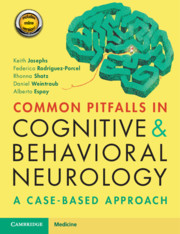Book contents
- Common Pitfalls in Cognitive and Behavioral Neurology
- Common Pitfalls in Cognitive and Behavioral Neurology
- Copyright page
- Dedication
- Contents
- Diseases Discussed in the Book
- Preface
- Acknowledgements
- Abbreviations
- Part 1 Missing the Diagnosis Altogether
- Part 2 Misidentifying the Impaired Cognitive Domain
- Part 3 Missing Important Clues in the History
- Part 4 Failure of Pattern Recognition
- Part 5 Difficult-to-Characterize Cognitive/Behavioral Disorders
- Part 6 Clinical Findings That Are Subtle
- Part 7 Misinterpreting Test Results
- Part 8 Attributing Findings to a Known or Suspected Disorder
- Case 36 “I Have Snored All My Life and It Never Affected My Work”
- Case 37 Starting Early
- Case 38 “I Have Been Taking the Same Medications for Years”
- Case 39 Cognitive Impairment and Blood Pressure Fluctuations
- Case 40 Corticobasal: The Syndrome versus the Pathology
- Part 9 Missing Radiographic Clues
- Part 10 Management Misadventures
- Index
- Plate Section (PDF Only)
- References
Case 39 - Cognitive Impairment and Blood Pressure Fluctuations
from Part 8 - Attributing Findings to a Known or Suspected Disorder
Published online by Cambridge University Press: 03 November 2020
- Common Pitfalls in Cognitive and Behavioral Neurology
- Common Pitfalls in Cognitive and Behavioral Neurology
- Copyright page
- Dedication
- Contents
- Diseases Discussed in the Book
- Preface
- Acknowledgements
- Abbreviations
- Part 1 Missing the Diagnosis Altogether
- Part 2 Misidentifying the Impaired Cognitive Domain
- Part 3 Missing Important Clues in the History
- Part 4 Failure of Pattern Recognition
- Part 5 Difficult-to-Characterize Cognitive/Behavioral Disorders
- Part 6 Clinical Findings That Are Subtle
- Part 7 Misinterpreting Test Results
- Part 8 Attributing Findings to a Known or Suspected Disorder
- Case 36 “I Have Snored All My Life and It Never Affected My Work”
- Case 37 Starting Early
- Case 38 “I Have Been Taking the Same Medications for Years”
- Case 39 Cognitive Impairment and Blood Pressure Fluctuations
- Case 40 Corticobasal: The Syndrome versus the Pathology
- Part 9 Missing Radiographic Clues
- Part 10 Management Misadventures
- Index
- Plate Section (PDF Only)
- References
Summary
This 86-year-old right-handed man with a 4-year history of Parkinson disease dementia (PDD) presented for follow-up with his wife, who reported a substantial decline. He was diagnosed with Parkinson disease (PD) five years prior and progressive cognitive impairment emerged three years later. At the visit, she described increasingly frequent episodes of unresponsiveness. These episodes would begin with the patient feeling tired, followed by a period of immobile unresponsiveness associated with glazed eyes lasting up to 10 minutes. The episodes occurred most commonly after eating breakfast. He was admitted to the hospital after one such event and his systolic blood pressure (BP) was reported to be as high as 250 mmHg, and was discharged on three new antihypertensive medications (lisinopril, hydralazine, and metoprolol). After this admission his episodes became more frequent. His wife noticed that having him lie down allowed him to recover promptly from episodes of unresponsiveness. No changes had been made to his levodopa regimen, which continued to be 200 mg three times a day.
- Type
- Chapter
- Information
- Common Pitfalls in Cognitive and Behavioral NeurologyA Case-Based Approach, pp. 122 - 125Publisher: Cambridge University PressPrint publication year: 2020

